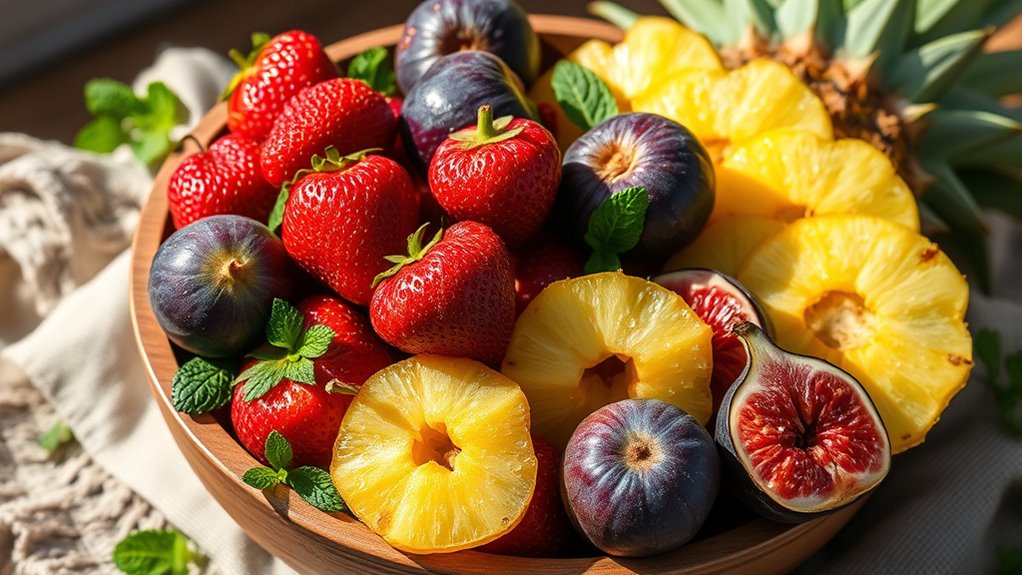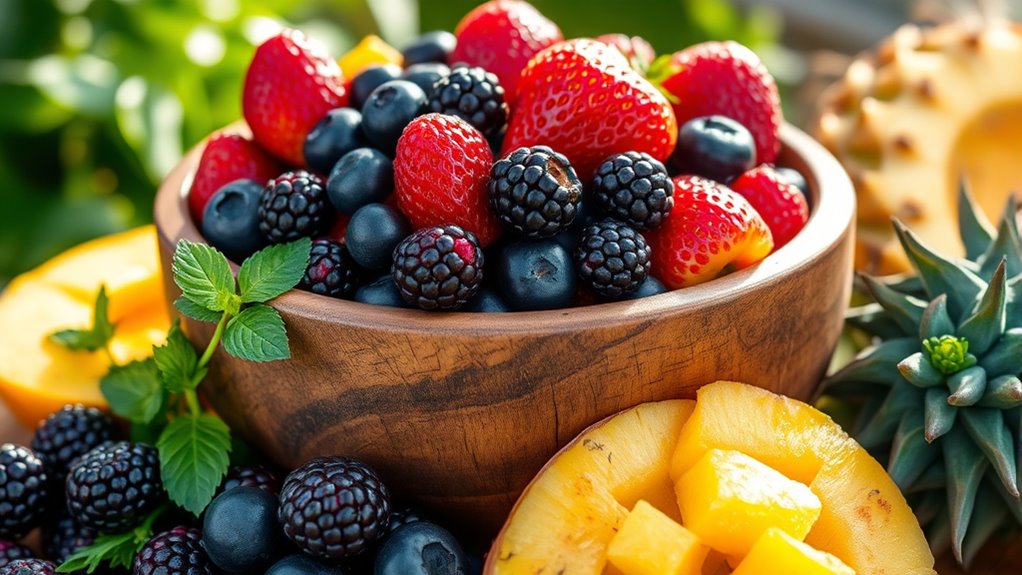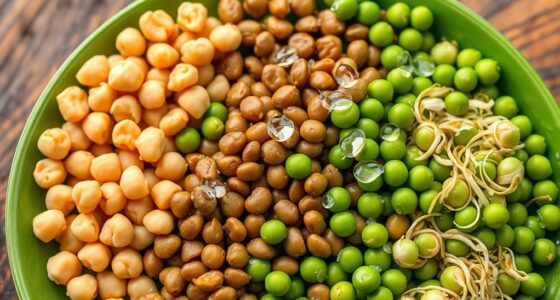Many believe all sugars are harmful, but natural fruit sugars in a raw diet aren’t the enemy. Unlike processed sweets, fruits contain fiber, water, and essential nutrients that regulate sugar absorption and support your health. Fruits like berries and cherries have a low glycemic index, offering steady energy without blood sugar spikes. By choosing whole, unprocessed fruits, you get crucial nutrients that processed sugars lack—learn why these natural sugars can be part of a healthy lifestyle.
Key Takeaways
- Natural fruit sugars are accompanied by fiber, water, and nutrients that slow absorption and improve metabolic processing.
- Whole fruits with low glycemic index support steady blood sugar levels, unlike processed sweets.
- Fiber in fruits regulates digestion, preventing blood sugar spikes and promoting satiety.
- Fruits provide essential vitamins, minerals, and antioxidants, offering health benefits beyond their sugar content.
- Incorporating moderate, whole fruits in a balanced diet enhances health without the risks associated with processed sugars.

Is sugar really the villain it’s often made out to be? Many people believe all sugars are harmful, but that’s a misconception. The truth is, your body handles natural fruit sugars quite differently from processed sweets. When you eat whole fruits, your body engages in sugar metabolism that works with fiber, water, and other nutrients to slow down sugar absorption. This means the sugar enters your bloodstream gradually, preventing spikes in blood sugar levels. The fruit glycemic index, which measures how quickly a food raises blood glucose, varies depending on the fruit but is generally lower than processed options. For example, berries and cherries have a low glycemic index, meaning they raise your blood sugar slowly, providing a steady energy release. In contrast, fruits like watermelon or ripe bananas have a higher glycemic index but still come with fiber and water, which temper their impact on your blood sugar.
Understanding sugar metabolism is essential here. When you consume natural fruit sugars, your body doesn’t need to work as hard to process them because the fiber in fruit slows the rate of digestion. This fiber forms a gel-like substance in your gut, which helps regulate the release of sugars into your bloodstream. This process not only supports stable blood sugar levels but also promotes feelings of fullness, making fruits a satisfying snack option. Plus, the nutrients in fruit — vitamins, minerals, antioxidants — offer numerous health benefits that processed sugars lack. These nutrients support your immune system, improve digestion, and help reduce inflammation.
It’s also important to recognize that the context of your diet matters. Eating whole fruits as part of a balanced diet doesn’t just satisfy your sweet tooth; it can actually contribute to long-term health. Unlike refined sugars found in candies, baked goods, or sodas, natural fruit sugars come packaged with beneficial compounds that support your well-being. The key is moderation and choosing fruits with a lower glycemic index when you’re concerned about blood sugar spikes. Incorporating a variety of fruits ensures you get a broad spectrum of nutrients and helps keep your diet balanced. Remember, the idea isn’t to eliminate sugar altogether but to understand its sources and how your body processes them.
Frequently Asked Questions
Does Fruit Sugar Impact Blood Sugar Levels the Same as Processed Sugar?
When you ask if fruit sugar impacts blood sugar levels the same as processed sugar, the answer is no. Fruit sugars have a lower glycemic index and cause a gentler insulin response, thanks to fiber and nutrients. Processed sugars spike your blood glucose quickly, leading to rapid insulin release. So, while fruit sugar does raise blood sugar, it’s less intense and more controlled compared to processed sugars.
Can Eating Too Much Fruit Lead to Weight Gain?
You might worry that eating too much fruit leads to weight gain, but it’s all about portion control and managing your calorie intake. Fruits are nutrient-dense and naturally sweet, making them a healthy choice. When you overeat, regardless of the type, calories add up. So, enjoy fruit in moderation, balance it with other foods, and focus on your overall diet to prevent unwanted weight gain.
Are Dried Fruits Healthier Than Fresh Fruits for Sugar Content?
When comparing dried fruit to fresh, dried fruit often has a higher sugar concentration because the water is removed, making the sugars more condensed. While dried fruit can be a tasty, portable snack, you should watch your portions to avoid consuming too much sugar. Fresh fruits typically have lower sugar levels and more water, making them a healthier choice if you’re concerned about sugar intake.
How Does Fiber in Fruit Affect Sugar Absorption?
You might wonder how fiber impacts sugar absorption, and it actually slows down the process. When you eat fruit, the fiber acts like a barrier, reducing the absorption rate of sugar into your bloodstream. This means your body processes the sugar more gradually, helping to prevent spikes in blood sugar levels. So, consuming high-fiber fruits can help you enjoy their natural sweetness without the negative effects of rapid sugar absorption.
Is Fruit Sugar Suitable for People With Diabetes?
Think of fruit sugars as gentle rain, nourishing your body rather than flooding it. If you have diabetes, you can still enjoy fruits, but choose whole fruits over fruit juice or fruit desserts, which spike blood sugar like a sudden storm. The fiber in whole fruit slows absorption, making it more suitable. Always monitor your blood sugar and consult your healthcare provider to find what works best for you.
Conclusion
So, next time you hear “sugar’s the enemy,” just smile and remember: nature’s fruit sugars aren’t out to sabotage your diet. They come packed with fiber, vitamins, and antioxidants—basically, the good guys in disguise. Instead of fearing fruit, embrace it as a delicious, wholesome ally. After all, if you’re going to demonize something, maybe start with processed snacks that actually deserve it. Stay sweet, stay smart!










